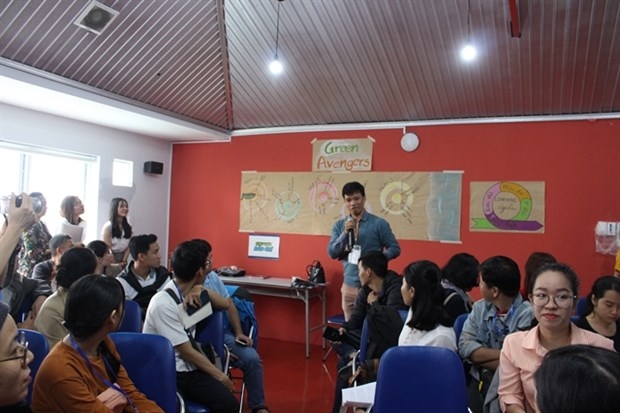UNDP helps Da Nang build circular economy hub
The Da Nang Business Incubator (DNES), in cooperation with the Accelerator Lab (AccLab) in Vietnam, which is also part of the United Nations Development Programme (UNDP) global network of 90 AccLabs, has launched the Da Nang Circular Economy Hub and Boot Camp to support innovative projects in the city and central Vietnam.

The hub, which debuted in the city on November 11, aims to help talented people with innovative projects in improving solid waste treatment and promoting sustainable consumption in communities in central Vietnam.
The Da Nang Circular Economy will select environmental ‘messengers’ to join green avenger programmes within the framework of the Da Nang Economic Circulation Network project.
It is estimated that between now and 2050, the total amount of solid waste in urban areas worldwide will increase by about 70%, while the amount of plastic waste dumped into the sea would overtake the number of fish.
Sitara Syed, UNDP Deputy Resident Representative in Vietnam, said: “Da Nang Circular Economy Hub (DCEH) will focus on people and resources for sustainable development and circular economic practice in the central region, as well as development of current solid waste treatment systems and advocacy for green consumption. From there, we will see the positive benefits for the environment and the community of this system in the future."
Nguyen Tuan Luong, a representative from UNDP, said: “In 2020, the world and Vietnam have suffered many natural disasters, especially the most recent is the historic flooding in the Central region. The DCEH will be a platform for dedicated people, connecting projects and creating innovative solutions for the environment to cope with the current situations.”
“In the distant future, DCEH promises to become a powerful network thanks to the enthusiastic individuals who commit to work for the sustainable development of Da Nang, thereby spreading inspiration in the central region."
The selection programme began on October 21 and will run until November 6, and 30 selected attendees will participate in five days of Boot Camp and plan to pursue the project for six months with the guidance of UNDP Accelerator Lab.
Projects selected through the programme will have a project implementation period until mid-2021 to spread the impact to the community, and this vision will be the foundation in forming a community network for innovative projects for environmental sustainability in the central provinces.
According to a report in 2016, Vietnam's urban solid waste totalled 11.6 million tonnes (an average of 0.33kg per person per day), which is forecast to double, to around 22 million tonnes by 2050.
The amount of plastic waste in the sea of Vietnam is currently ranked 4th in the world, with more than 1.83 million tonnes per year. The above problems have great pressure on the economy, and require it to change the development model. Therefore, an economy that is cyclical (a circular economy) is considered to be the best way to break the longstanding bonds between economic growth and negative environmental effects.
The circular economy helps promote economic development with reducing both resource extraction and waste to the environment.
The Accelerator Lab (AccLab) in Vietnam had helped build up a model of friendly garbage classification at living quarters in Cẩm Lệ District, and studying the informal waste collection ecosystem and the impact of COVID-19 on bottles.
Da Nang's business start-up ecosystem, which debuted in 2014 as a base for the younger generation to begin their careers, helped produce 300 start-up projects from the ecosystem’s co-working space.
In 2017, the Song Han Incubator Centre, which was the first private sector incubator, was founded as a consultancy for young people starting businesses.
The centre has supported 40 start-up projects in tourism in Da Nang and HCM City.
